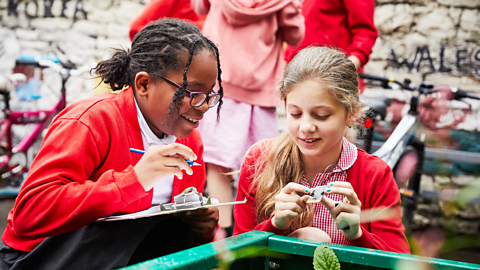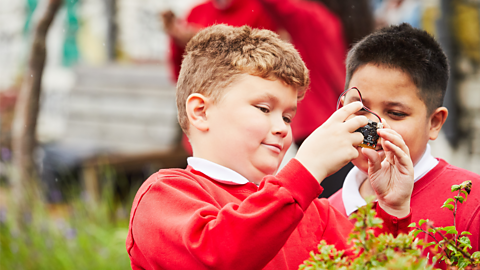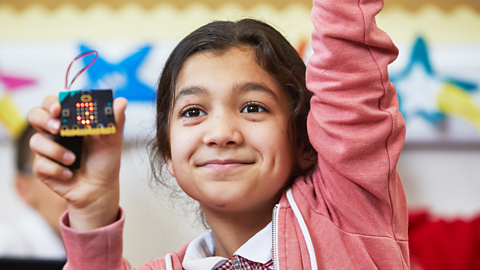You can no longer submit your playground survey data, but you can still do all of the activities with your class.
An engaging whole class activity that introduces the BBC micro:bit playground survey and how to get started. Pupils will discuss DataInformation collected for use elsewhere. privacy and security, and make their playground map to define their playground boundaries.
Download a poster for your class to keep track of your results here.
Watch the video
Shereen: Hey, what's up? My name's Shereen.
Big Manny: And I’m Big Manny.
Tilly: I’m Tilly and this is…
Yussef: Yussef.
Big Manny: You are the next generation of awesome data scientists.
Shereen: And we need your help.
Big Manny: The micro:bit is a brilliant piece of tech. You can program it to do almost anything that you can think of.
Tilly: We need you to use code to transform the micro:bit into four different tools you can then use to collect important data about your school playground environment.
Shereen: You need to get creative, curious, and have some fun.
Big Manny: You'll be measuring the surface temperatures of materials.
Yussef: And we want you to use your micro:bits to carry out a biodiversity survey.
Shereen: You'll also be calculating your playground area.
Tilly: And keeping track of what physical activities you do in the playground.
Yussef: The micro:bit is so mighty it can even detect and analyse movement.
Tilly: It does this through the accelerometer that's built into the micro:bit and the special program that was created using machine learning. You'll also learn about how the Activity Tracker program was made and get a chance to train your own machine learning model.
Shereen: Now that is unbelievably cool.
Yussef: We can challenge each other to learn new coding skills as we program our micro:bits and really push each other to become the best data scientists we can be.
Big Manny: That's a great idea.
Shereen: Let's do it.
Big Manny: Let's see who can collect the most accurate measurements.
Tilly: Game on.
Yussef: Can you predict what you might discover? Your results may surprise you.
Shereen: So what are you waiting for?
Big Manny: Why don't you start by mapping out your playground?
TIlly: That way you can identify the boundaries you'll be working within.
Playground survey teacher notes
- To complete this activity you will need the helpful teacher instructions and pupil worksheet.
- In this activity pupils are introduced to the BBC micro:bit playground survey and can start to think about the key questions that are being investigated and the different subject areas that will be covered.
- It will be very useful for pupils to have access to a map of their school playground to support the various survey activities – in particular the Measuring AreaThe amount of space taken up by a two-dimensional shape. activity. Pupils can enjoy a simple map making session with the option to include a fun fieldwork exercise, before getting stuck in to the data collection activities.
- We would love to see how your class is getting involved with the BBC micro:bit playground survey. Why not share updates about your activities on social media and let us know by tagging @BBC_Teach and using #BBCplaygroundsurvey
Topics covered
- Computing/ICT/PSHE/Health and Wellbeing: Online safety – personal information and security; Appropriate uses of personal information.
- Geography/Humanities: Understanding plan/birds-eye view and aerial photos; Interpreting and navigating a digital map; Identifying key features and location on a map; Carrying out fieldwork and recording information; Creating a simple map with symbols and a key.
Suggested learning objectives
- Introduction: To understand what a survey is and how they help us to answer questions; To explore an overview of the playground survey activities and data collection.
- Data privacy and security discussion: To consolidate existing knowledge about the issues around personal data collection and privacy; To learn how anonymisation of personal data can ensure that individuals cannot be identified; To identify possible situations where sharing data is safe.
- Making a map: To create an outline map/plan of the playground that will be used during the survey including symbols and a simple key; To use existing maps/plans/digital mapping tools to locate features and structures; To use fieldwork skills to explore and record information about a familiar location.
Suggested extension activities
- Computing/ICT/PSHE/Health and Wellbeing: Create a peer-to-peer short video about data privacy; Make a comic strip about data security and keeping personal information private; Create a poster/acrostic poem/top tips list of ways to keep personal data secure.
- Geography/Humanities: Add grid lines and numbers to the playground map and use 4/6 figure grid references to locate key features; Use map for a treasure hunt activity – perhaps with younger children; Use map to support orienteering activities using a CompassA sensor that detects magnetic fields.; Add a scale to the map once the dimensions have been calculated; Create their own symbols for familiar features and add their own key/legend; Use compasses to identify North and add this to the maps with a compass rose.
- History: Explore older maps of the school and playground and compare to the current map – identify changes and things that have stayed the same and create a playground timeline.
- Maths: Identify the main shapes in the playground outline and draw them on the map and measure the various angles.
- Design and Technology: Make a jigsaw puzzle from aerial photos of the playground.

Get started with the playground survey activities
Comparing surface temperatures - try this first! videoComparing surface temperatures - try this first!
Enjoy comparing surface temperatures in four areas of your school playground with the micro:bit Thermometer program.

Investigating biodiversity. videoInvestigating biodiversity
Use the micro:bit Biodiversity Counter program to investigate the number of different species of plants and animals in your playground.

Playground survey glossary
A helpful glossary to increase your confidence when teaching the seven BBC micro:bit playground survey activities.
